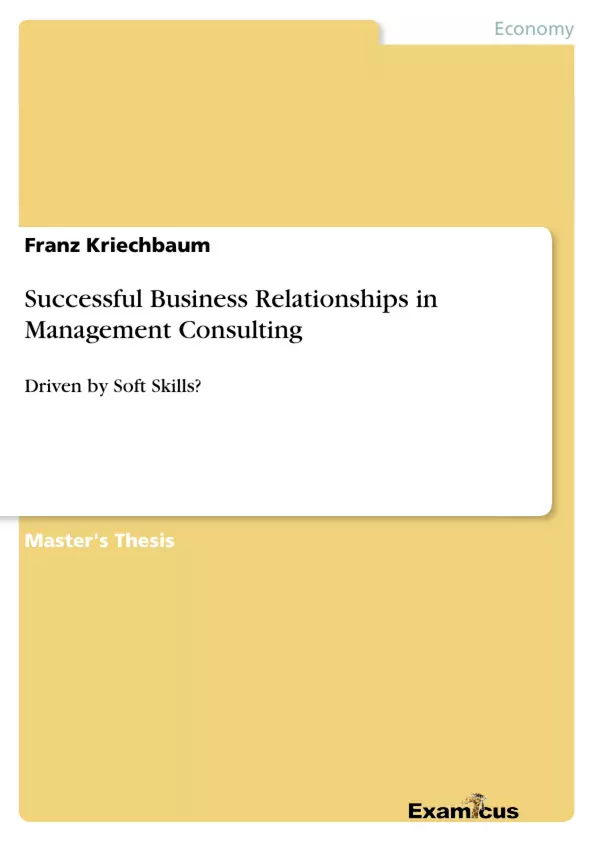Die Arbeit untersucht den Effekt von Soft Skills (Aktives Zuhören, Emotionale Intelligenz "EI", Ethik und Integrität)und Fachwissen eines Beraters auf die Kundenbeziehung in den Dimensionen (Vertrauen, Loyalität, Zufriedenheit, Kundenbindung).
Im Rahmen einer Feldstudie wurden 181 Führungskräfte mit Einfluß auf die Beraterauswahl aus dem Bereich der Maschinenbau- und Automotive-Industrie mittels eines webbasierten Fragebogens befragt.
Inhaltsverzeichnis (Table of Contents)
- 1. Introduction
- 1.1 Background, Scope, and Context
- 1.2 Motivation, Research Objectives, and Hypotheses
- 1.3 Approach and structure
- 2. Literature Review
- 2.1 An Overview
- 2.2 The Specific Characteristic of Management Consulting Services
- 2.3 Business Relationships
- 2.3.1 What are Business Relationships?
- 2.3.2 The Role of Trust and Commitment
- 2.3.3 Customer Satisfaction
- 2.3.4 Customer Loyalty, Retention, and Defection
- 2.4. Soft Skills - Drivers of Successful Business Relationships?
- 2.4.1 Definition and Scope
- 2.4.2 Communication Skills
- 2.4.3 Emotional Intelligence
- 2.4.4 Ethics and Integrity
- 2.5 Literature Review Summary and Implications
- 3. Aims, Objectives, and Hypotheses
- 3.1 Aims and Objectives
- 3.2 Building of Sub-Hypotheses
- 4. Research Design
- 4.1 Philosophy, Approach, Purpose, and Method
- 4.2 Sampling and Data Collection
- 4.3 The Research Instrument
- 4.3.1 Appropriateness
- 4.3.2 Measures
- 4.3.3 Reliability and Validity
- 4.3.4 Questionnaire Design and Administration
- 4.4 Data Analysis and Presentation
- 4.4.1 Scale, Reliability and Assumptions
- 4.4.2 Hypothesis Testing
- 5. Results
- 5.1 Data Presentation
- 5.1.1 Sample Description
- 5.1.2 Business Relationships and Skills
- 5.2 Hypotheses Testing
- 5.2.1 Statistical Significance
- 5.2.2 Sub-Hypotheses SH1 - SH3 and SH5-SH7
- 5.2.3 Sub-Hypotheses SH4 and SH8
- 5.2.4 Sub-Hypothesis SH9
- 5.2.5 Basic Working Hypothesis
Zielsetzung und Themenschwerpunkte (Objectives and Key Themes)
This study investigates the impact of soft skills and technical skills on the key characteristics of successful business relationships in management consulting. The main objective is to determine the relative importance of soft skills in fostering client satisfaction, trust, loyalty, and retention within the context of a changing market landscape for consulting services.
- The role of soft skills (active listening, emotional intelligence, ethics, and integrity) in building successful client relationships.
- The comparative impact of soft skills versus technical skills on client relationship characteristics.
- The implications of these findings for human resource management within consulting firms.
- The relationship between client satisfaction, trust, loyalty, and client defection.
- Analysis of business relationships in the management consulting industry.
Zusammenfassung der Kapitel (Chapter Summaries)
Chapter 1: Introduction provides background information on the changing consulting industry and introduces the research objectives and hypotheses. Chapter 2: Literature Review examines existing research on business relationships, the specific characteristics of management consulting services, and the role of soft skills. Chapter 3: Aims, Objectives, and Hypotheses details the study's aims, objectives, and sub-hypotheses. Chapter 4: Research Design outlines the research methodology, including sampling, data collection, and analysis techniques. Chapter 5: Results presents the findings of the data analysis regarding the relationships between soft skills, technical skills, and business relationship characteristics.
Schlüsselwörter (Keywords)
Management consulting, business relationships, soft skills, technical skills, client satisfaction, trust, loyalty, client retention, client defection, emotional intelligence, ethics, integrity, active listening, human resource management, empirical research.
Frequently Asked Questions
How do soft skills impact management consulting relationships?
Soft skills like active listening, emotional intelligence, and integrity significantly influence client trust, satisfaction, and long-term loyalty.
What are the key dimensions of a successful business relationship?
The study identifies trust, loyalty, satisfaction, and client retention as the primary dimensions of success in consulting relationships.
Which soft skills were specifically investigated in this study?
The research focused on communication skills (active listening), emotional intelligence (EI), and ethics/integrity.
What is more important: soft skills or technical expertise?
The study analyzes the relative importance of both, suggesting that while technical knowledge is a baseline, soft skills are the primary drivers of relationship depth and retention.
What industry was the focus of this research?
The field study involved 181 executives from the mechanical engineering and automotive industries who influence consultant selection.
- Citar trabajo
- Franz Kriechbaum (Autor), 2010, Successful Business Relationships in Management Consulting, Múnich, GRIN Verlag, https://www.grin.com/document/186727



